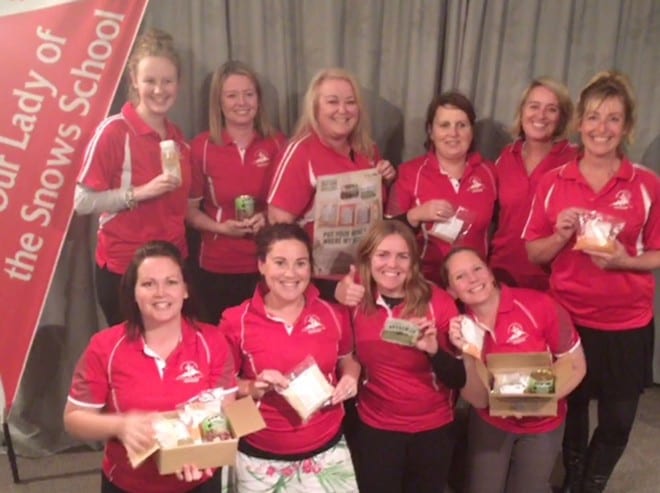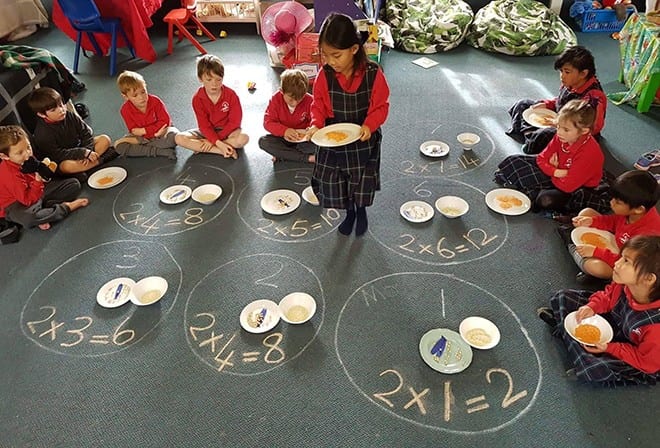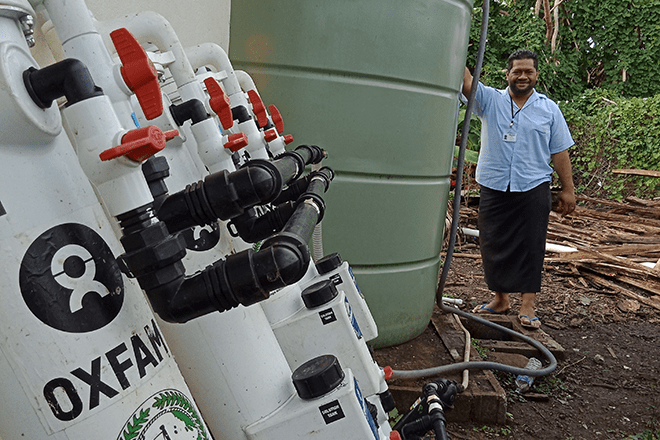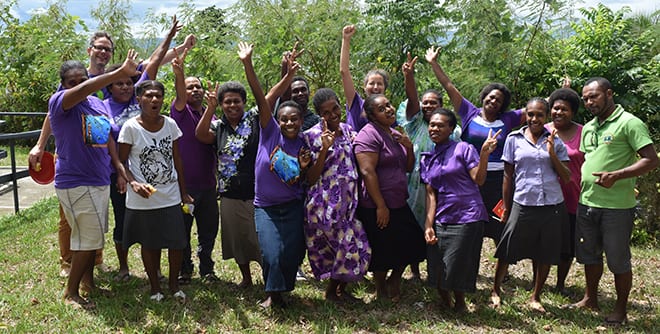Blog
Political leaders must wake up to the danger of climate change

Cyclone Winston devastated Fiji in 2016, including the village of Nayavutoka, in Ra province. The local church, pictured, served as emergency shelter for the whole community during the ferocious storm. Photo: Alicja Grocz/Oxfam
Two and a half years ago I sat barricaded inside my home in Fiji, listening to a ferocious wind travelling at an average speed of 230 kilometres an hour.
Over the howl of the wind I could hear trees crashing down outside. I didn’t know how long the storm was going to last. I didn’t know where the next tree would fall.
When the wind finally eased, I ventured outside to see if my neighbours were OK; to see if their houses were still standing. I’ll never forget that feeling.
Cyclone Winston was the biggest cyclone ever to make landfall in the Southern Hemisphere. The devastating storm left 44 people dead and 350,000 people, almost 40% of Fiji’s population, were affected. Total damage and losses from Winston are estimated at $1.42 billion: equivalent to nearly a third of Fiji’s GDP.
Anyone who’s been watching the news recently knows that Cyclone Winston wasn’t a one off. Already this year we’ve witnessed killer storms raging around the world from the Philippines to the USA, wreaking death and destruction.
Today marks a seminal moment in efforts to tackle climate change. The Intergovernmental Panel on Climate Change produced its first major report in four years outlining what’s going to happen if the world allows average temperatures to increase more than 1.5 degrees Centigrade.
Here in the Pacific Islands, we don’t need climate scientists to tell us what the impacts of climate change will be. We’re already experiencing them. We’re no longer talking about the future; people are already fighting for their lives against disasters intensified by climate change.
Most of us who are being battered by climate change are based in some of the world’s poorest countries. At Oxfam, we understand well the ruthless inequality of climate change: poor communities are five times more likely to be displaced by extreme weather than rich ones.
For us, rising seas, combined with more intense storms, are increasing coastal erosion and inundation. By one estimate, in the long term, sea-level rise resulting from 2°C of warming could submerge land across the world that is currently home to 280 million people.
The world’s atoll nations face a truly existential threat from sea-level rise; for us, our lives and our very way of life, is in the balance.
Take the situation my fellow Pacific Islanders in Kiribati face as an example. Kiribati is a large ocean state comprised of 32 atolls and one raised coral island, spread across more than a million square miles of the central Pacific Ocean, and with a population of approximately 110,000.
Almost the entire land area of Kiribati, including the whole of the main population centre of South Tarawa, lies less than three metres above sea level. Kiribati is considered one of the most vulnerable countries on earth to the impacts of climate change.
The nation’s people, the I-Kiribati, fear not only the loss of their livelihoods and security but also the impact of displacement on their culture and identity, sovereignty, and deep connection to their land and sea.
Tinaai Teaua, a member of Kiribati Climate Action Network, told Oxfam: “Land is very important. We can’t leave. We don’t want to leave. This is our home and this is our land. We should stay here. But the problem is getting closer and closer. My message to the world [is] to look at us. What our culture is like. How we are so proud of being I-Kiribati. The main message is to limit warming to 1.5°C. That was already agreed, but now they have to live up to their words.”
The case of Kiribati highlights the need for stronger international action to minimise the impacts of climate change and provide greater support to vulnerable communities. The loss of homes, livelihoods and ancestral lands through displacement epitomises the human cost and the grave injustice of climate change.
Today’s IPCC report is expected to echo the existing consensus that if global warming is to be limited to 1.5°C then concerted, bold, global action is required. Some of the world’s poorest and low emitting countries are now leading the climate fight – including Fiji and the Marshall Islands who recently committed to reduce their emissions to net zero by 2050. It’s time for all rich countries to follow suit and show how they’ll clean up their emissions and reduce their net greenhouse gas emission to net zero within a generation. No excuses.
It’s the laws and targets set by rich countries which will determine the future of the world’s poorest people. Countries like New Zealand have a moral obligation to lead the way.
How many more ‘once-in-a-lifetime’ storms will it take before our leaders face up to what’s going on and act? For too long, too many countries have talked a good game when it comes to climate change, but failed to deliver concrete action.
As many of us know all too well: climate change is eating away shores and flooding homes. It’s leaving farmland bone-dry, shattering the lives of millions who did virtually nothing to cause it. It’s simply unconscionable to leave poor communities alone to deal with disasters they did not create.
The way that New Zealand, and the rest of the international community, responds to climate change is a litmus test for our humanity. It’s a test we can’t afford to fail.
By Raijeli Nicole, Oxfam in the Pacific regional director.
Hidden truth – why fair tax matters in NZ

Last week, we revealed that it looks like New Zealand is losing $21 million a year to unfair tax avoidance by four big pharmaceutical companies – Abbott, Merck & Co. (also known as MSD), Johnson & Johnson, and Pfizer. Some of you may have seen comments about the way we conducted the research – our methodology. We’ve got a great blog about the methodology from our American colleagues who led the research. But we want to take a slightly different angle, because the comments about our method actually support what we are saying – that if we want an accurate picture of what companies earn and owe we need more publicly available information so that we can use more robust information.
Oxfam knows that corporate tax avoidance helps to entrench poverty and inequality. In fact, tax avoidance is a matter of life and death. We found that across only seven countries, these four pharmaceutical companies appear to be avoiding paying about $167 million in taxes. That’s enough to vaccinate 10 million girls so that they don’t get cervical cancer, which kills one woman every two minutes, mostly in developing countries.
Because of this, it is critical that we talk about tax avoidance. But it is a very complex subject. Large multinational companies have huge amounts of resources that they can use to manoeuvre their business across the globe, juggling their profits to avoid paying tax. And they share little information publicly about their economic activities. This means that we can’t see what they’re doing. It is particularly difficult for poorer countries to investigate tax avoidance, yet they rely heavily on corporate taxes to provide essential services, such as preventing and treating cancer.
Our methodology was a reasonable approach to the lack of information available. We would not need to use estimates if we had access to all the information we needed to assess the potential tax avoidance practices of multinational companies like the four big pharmaceutical companies we examined. We would have the actual information. This is why we are asking the New Zealand government to make multinational companies publish key financial information.
We didn’t devise our methodology alone. Oxfam spoke with current and former executives from the top ten pharmaceutical and accounting firms, as well as other tax experts. These included people from the Institute on Taxation and Economic Policy, Global Witness, and the head of tax for a global 100 company. We also received assistance from two international corporate tax experts: the head of the secretariat of the Independent Commission for the Reform of International Corporate Taxation, and an academic who used to be a transfer pricing senior manager in Deloitte LLP. We don’t take this kind of work lightly. We wanted to make sure we used the best methodology possible in an environment where multinational companies hide important information about their operations.
Some argue that multinational companies will have low profit margins in New Zealand because of Pharmac. We thought about this, too. Pharmac is fantastic at its job, but its way of working can’t explain our findings. We found that the profit margins across all developed and developing countries were similar – on average, between 5 and 7 percent. New Zealand’s was 6 percent, so pretty much the same as all other countries. Meanwhile, in tax havens – where companies pay no or low tax – the profit margins were a whopping 31 percent. New Zealand is not an outlier but part of a common story across all the countries we looked at. Our research showed a pattern. Something is going on here in a systematic way across the globe – something like profit shifting to avoid paying taxes.
A key principle for tax is that profits should be taxed where they are made. Some argue that the driver of profitability in the pharmaceutical industry is the creation of intellectual property through research and development (R&D). Following from this, you would expect to see higher profits and higher taxes paid in countries where R&D takes place. Not surprisingly, we do not have a clear idea of where these four big pharmaceutical companies do their R&D, so it is hard to assess where they are creating value that would lead to profits. Again, this is why we’re calling for more information to be available in the public realm.
Our global tax system is broken. We need a public conversation about how to fix it. And to do this, we need public information. This is why we’re asking our government to make multinational companies publish key financial information, so we can make them pay their fair share. Tax avoidance hurts us here in New Zealand, but poor women and girls in poor countries are the ones who really bear the brunt of multinationals’ tax avoidance. They often pay with their lives.
By Joanna Spratt, Advocacy and Campaigns Director, Oxfam New Zealand.
Ration Challenge participant shares her experience
“I’ve been to Syria and seen it as a functioning society where there was everything we have here. There were shops, you could get ice cream – all the things we take for granted, they had too. I had a few people say, oh, they won’t know any different. But they do. And even if they didn’t, does that make it better or worse?”

Cara McGrath and her team hold the small amount of food they ate during Ration Challenge week – exactly the same food distributed to Syrian refugees living in camps in Jordan.
Cara McGrath was one of over 5,000 Kiwis who took on the Ration Challenge, experiencing a glimpse of one of the many challenges that refugees face day in, day out, by eating the same rations they do for one week. The funds she and other participants raised will provide food and access to healthcare and education for Syrian families facing an indefinite amount of time in refugee camps in Jordan, as well as contributing to Oxfam’s work around the globe – particularly in the Pacific region.
She felt drawn to the challenge as she thought of her experience in Syria in 2001, remembering a time in the Middle East long before the refugee crisis we’re witnessing today. Seeing the challenge on Facebook was a call to action for Cara, and a chance to stand in solidarity with millions of displaced, traumatised families now seeking refuge in Jordan.
“The challenge was hard, but I still had a nice bed and a nice house, I had my family around me, I wasn’t traumatised or afraid. I hadn’t realised it but food is a big part of what motivated me through my day. It is so much a part of how we interact with each other.”
Cara is part of Team OLS, the Ration Challenge’s front-running fundraising team, sitting on an incredible team total of $10,665.
“We are the teachers, board, school fundraising team and supporters for a tiny little school in Methven in the South Island, called Our Lady of the Snows School. One of the school’s core values is social justice, so it’s great to know that parents are doing something at home and it’s happening in the classroom too. Everyone’s on the same page.”
The food in the ration packs that Cara and over 5,000 other Kiwis ate during Refugee Week is exactly the same food, in almost exactly the same quantities, that is distributed to refugees in the camps – just a small amount of rice, lentils, chick peas, kidney beans, sardines, flour and oil.
“I wasn’t a huge fan of the lentil soup, I have to say. I ate it for two or three days in a row, and when I only had a tiny bit left I put it in with my rice and had fried rice and lentils – and it was really good! I was so disappointed that I’d been eating lentil soup for three days when I could have been eating fried lentils!”
Fortunately for Cara and her team, they fundraised enough to gain rewards to add a little variety to their week – spice, sugar, milk, vegetables and even some extra protein, all achieved by meeting fundraising targets. But for Cara, the biggest motivator was knowing that – for her – the challenge would come to an end.
“We get to finish it. I kept thinking, I’ll have that on Friday when I finish. It would be so much harder not knowing when it’s going to finish, or if it’s going to finish. We’re so remote and isolated here, we’re in our own little bubble, and sometimes it’s hard for people to think outside their bubble.”
One member of Team OLS – Tania Goodwin – even extended the challenge to her junior students, crafting a full day of teaching around the refugee crisis. The children were taught about the realities of refugee life, and watched videos of refugee families. They wrote prayers to Syrian children, a helped their teacher measure out her rations for the week. They even fled from their classroom and into a safe space, where they built shelters and worked from inside them.

A class of children from Our Lady of the Snows School help their teacher, Tania Goodwin, ration out her food for the week.
Cara has a word of advice for those thinking about being part of the challenge in future: “Read the information and get to know the stuff. Oxfam sends out loads of great things, so using those and building an understanding then means it’s more than just an experience where you don’t eat very much for a week – you actually learn something too.”
This awesome Ration Challenge team consists of Deidra O’Shea, Sonia Cullen, Rachel Clark, Kylie Fitzgerald, Connie Quigley, Becky Dirks, Georgia Annear, Tania Goodwin, Pattie Ree, Colm McGrath, and Cara McGrath.
To support them, visit their fundraising page.
Our Cyclone Gita response continues

Mausa Halala (pictured) is a volunteer with the Tonga National Youth Congress – Oxfam’s local partner in Tonga. He and other volunteers, trained and equipped by Oxfam to provide emergency water supplies, were working within hours of the storm, purifying and distributing safe drinking water on Tongatapu and ‘Eua. Thanks to your ongoing support, they’re still responding! Photo: Darren Brunk
Oxfam & partner’s ongoing response to Cyclone Gita.
“This has been a great experience… going out and [reaching] people that are in need shows us just how much our students are willing to help people,” says ‘Ofa Pakalani of Tonga National Youth Congress, Oxfam’s partner in Tonga.
When you support Oxfam’s response to disasters such as Tropical Cyclone Gita, which struck the Kingdom of Tonga in February, you’re supporting teams of local volunteers who are often affected by the very emergencies they’re responding to. Who better to support and develop a community than those from it?
We’ve built a strong partnership over nearly 10 years with Tonga National Youth Congress (TNYC). Thanks to your support, we’re able to provide disaster preparedness and response training to teams of youth volunteers across Tonga so that when disasters like Cyclone Gita hit, young Tongans have the confidence, training and equipment to lead response efforts and help their communities recover.
The youth involved with TNYC are showing the positive impact that young people can have in their communities, and they are saving and rebuilding lives in the process. And your support is helping make TNYC’s work possible! The funds generously donated by Oxfam NZ’s supporters are being used to purchase supplies for the water, sanitation and hygiene (WASH) kits that TNYC distribute to those in need, as well as keeping vital equipment running and maintained, and providing support to TNYC volunteers as they dedicate days and weeks away from home to help their country recover.
“This response shows the power of partnerships with local organisations. TNYC youth volunteers are leading an excellent disaster response that is saving lives and alleviating suffering. In the process, TNYCis changing public attitudes in Tonga around youth for the better, by demonstrating the contribution that young Tongans can make to their community,” says Darren Brunk, Oxfam NZ’s humanitarian specialist, who works closely with the TNYC volunteers.
Working together with Oxfam, TNYC volunteers were among the first responders in the country when Cyclone Gita hit, and have been working tirelessly ever since to rebuild the lives of those in their local communities.
The response began as a life-saving one. More than 70,000 people on the islands of Tongatapu and ‘Eua were affected, with homes and community buildings destroyed, crops ruined and lives turned upside down. Thousands of rainwater tanks were toppled and communal water sources were flooded with contaminated water, leaving 17,000 people without water or at risk of contracting a disease. TNYC were out immediately following the storm and distributed 1,431 emergency relief items like soap and tarpaulins, filtered contaminated water, cleaned and repaired tanks, and provided emergency water storage and distribution. Since the cyclone, Oxfam and TNYC have provided over 1,107,000 litres of safe drinking water to affected communities – that’s enough to supply the entire population of Tonga for two days!
On top of this, Oxfam and TNYC are conducting hygiene education classes at schools, helping protect 3,600 children from water and vector-borne disease. Alongside TNYC and Caritas Aotearoa NZ, and with financial support from the New Zealand Government, we had urgently-needed supplies on the ground ready for distribution before the storm hit – an action unique amongst international humanitarian NGOs.
Four months after the storm, we’re still there with TNYC working on the long-term rebuild. Cyclone Gita devastated many vital food sources and markets in Tonga – coconuts, bananas, fruit trees and root crops. Together with support from the New Zealand Government, Oxfam and TNYC are growing seedlings and distributing seeds to 800 farmers to help recover their livelihoods. Working with communities, we’re also identifying and assisting the most vulnerable families – such as single women-headed households and people with disabilities – to buy the produce grown through this initiative and to sell at local markets so as to restore their own incomes and livelihoods.
TNYC’s incredible work has garnered a lot of positive feedback from the communities reached:
“Thank you for everything, we feel a lot safer now.”
“Thank you TNYC volunteer workers for the hard work. We appreciate everything that you have all done.”
“The technology used to purify our water installs a sense of assurance that we can expect clean and safe water.”
“Come back! ‘Eua needs you TNYC and Oxfam!”
Read more about TNYC and their work.
This response is generously supported by Oxfam Canada (through the Canadian Humanitarian Assistance Fund), UNICEF Pacific, the Auckland Mayoral Fund, the Ministry of Foreign Affairs and Trade, Oxfam Global Giving, and Oxfam New Zealand supporters.
Education and employment for Ni-Vanuatu
Photo: Glen Pakoa/Oxfam in Vanuatu
The youth population in Vanuatu is booming – and our local partner, Youth Challenge Vanuatu (YCV), specialises in offering these young people employment and enterprise training courses.
Aimed at those without school qualifications, YCV’s courses, which include life skills, internships and counselling, smooth their pathway into employment, enterprise or further study.
Ni-Vanuatu youth have to navigate hard realities – few jobs, a low-wage economy for unskilled jobs, and a high cost of urban living. Limited schooling opportunities mean that most young people don’t finish secondary school – in fact, only 32% even enrol. After leaving school, most have only two options: return to the family farm, or move to urban areas looking for work – areas where 35% of people are unemployed.
These challenges are particularly acute for disadvantaged youth – early school leavers, adolescent mothers and youth with disabilities.
Oxfam works through partnerships with local organisations on the ground, because who knows the community better than the ones living in it?
We’ve partnered with YCV to help them grow and develop their organisation so more young women and men will be able to thrive as employees and entrepreneurs, and engage as active citizens around the issues that are important to them. Most of YCV’s staff have come through the programme themselves, so they know the challenges these young people face – and the life-changing difference YCV’s support can make. Take a look at the stories of some of YCV’s graduates.
Vanuatu’s young people are the country’s biggest resource – with the right opportunities, these young people will be the leaders of Vanuatu’s social and economic development.
Together with YCV, you, and Oxfam, this is what the programme will achieve:
- Over 2000 young women and men develop their knowledge, skills and confidence to pursue their chosen career path.
- More young women and men are in employment, self-employment or further study, and are advocating around youth issues.
- Youth will access innovative, effective courses that give them the skills employers are looking for, as well as complementary services like internships, enterprise incubators, career and enterprise counselling, an electronic resource library, and careers events.
- YCV will develop a new course in social enterprise, giving youth the opportunity to learn the ropes of running a business while keeping the social purpose at the forefront.
- YCV will be a stronger organisation, able to demonstrate the high quality of their services, and with a range of income streams that allow them to continue to serve underprivileged youth.
Want to be a part of supporting awesome programmes like this? The best way to do so is to give a regular gift – long-term programmes rely on long-term support.







